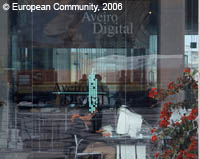Readiness for eGovernment will bring big savings to EU, says Commission
For some time now, indicators have shown the success and potential of eGovernment, with several EU countries leading the way in modernising their public administrations. Such e-savvy champions include Denmark, which recently reported saving taxpayers a whopping 150 million euro and businesses 50 million euro a year by introducing an electronic invoicing service. According to a proposal by the European Commission, further savings of several hundred billion euro could be made annually if such electronic services are quickly and collectively implemented across Europe. Published on 25 April, the action plan, entitled 'i2010 eGovernment Action Plan: Accelerating eGovernment in Europe for the Benefit of All', draws on the Ministerial Declaration adopted at the Manchester eGovernment Ministerial Conference in November 2005, which set clear expectations for widespread, measurable benefits from eGovernment in 2010. The action plan makes the link between national competitiveness, innovation strength and the quality of public administrations, citing countries such as Denmark, which score high on public-sector openness and efficiency and eGovernment readiness, as well as on economic performance and competitiveness scoreboards. This can only mean one thing, the proposal claims, that in the global economy, better government is a competitive must, and therefore key to achieving the Lisbon objectives. The Commission's proposal outlines five specific areas in which practical headway can be made between now and to 2010 in order to accelerate the delivery of eGovernment service, and, at the same time, ensure tangible benefits for all European citizens and businesses. Such areas include the need for more efficient services that save time and money, and services that are meaningful for businesses, administration and society at large. The action plan suggests making fuller use of mechanisms already in place to measure progress and share best practices with regard to mainstreaming eGoverment. There is also the challenge of fighting the digital divide and encouraging social inclusion. Again some Member States have already pioneered services that specifically target 'disadvantaged' population groups. In Belgium, disabled people can now obtain benefits over the Internet in seconds, whereas previously it took three to four weeks. However, there is room for improvement, says the Commission, pointing to the need to ensure compliance by governments with the eAccessibilty guidelines, and the agreement to measure objectives on the way to making all citizens beneficiaries of eGovernment by 2010. Linked to the issue of social inclusion is the challenge of strengthening citizen participation and democratic decision-making in Europe. According to the Commission, 65 per cent of respondents to a recent public consultation on eGovernment said that eDemocracy could help reduce Europe's democratic deficit. Mindful of this, the action plan proposes supporting experiments in the use of information communications technologies (ICT) for more effective public participation in policy making. In the area of eProcurement, which is considered a high-impact service given that government procurement represents 15 per cent of GDP or 1,500 billion euro, the action plan gives practical steps to Member States on how to achieve 100 per cent availability and at least 50 per cent take-up of online procurement by 2010. If successful, it is estimated that such measures could yield global annual savings of 40 billion euro. Finally, in the context of the increased mobility of citizens across the EU, the action plan also highlights the need for services to be easily accessible across different national borders, and points to fostering mutual recognition and interoperability between electronic services as a means of ensuring secure communications between different public administrations.



